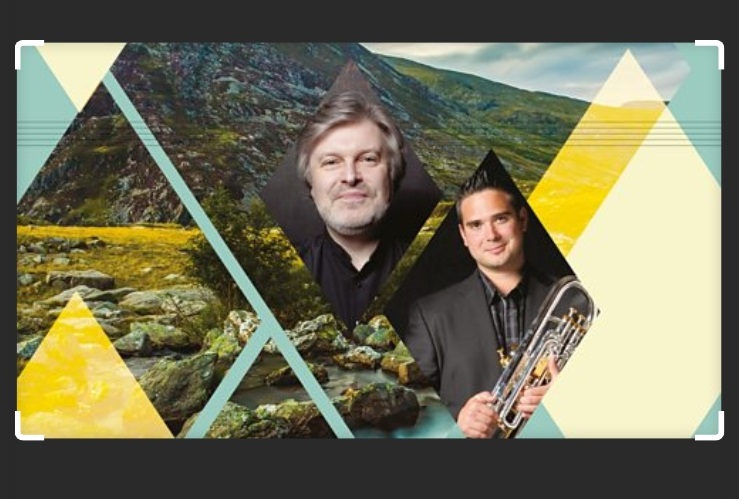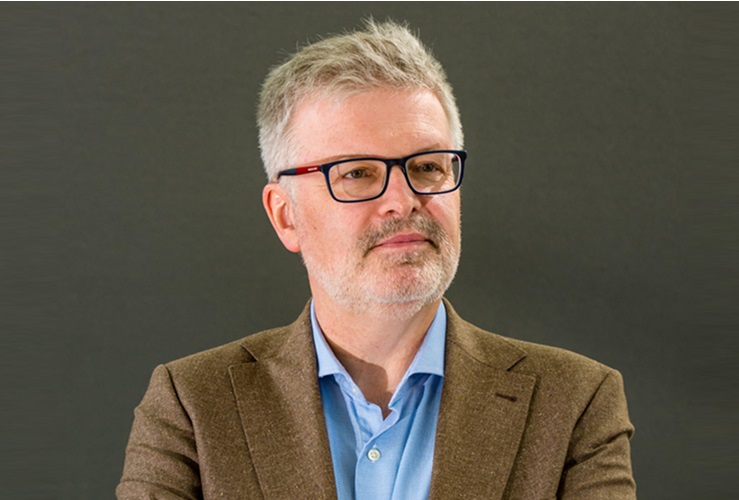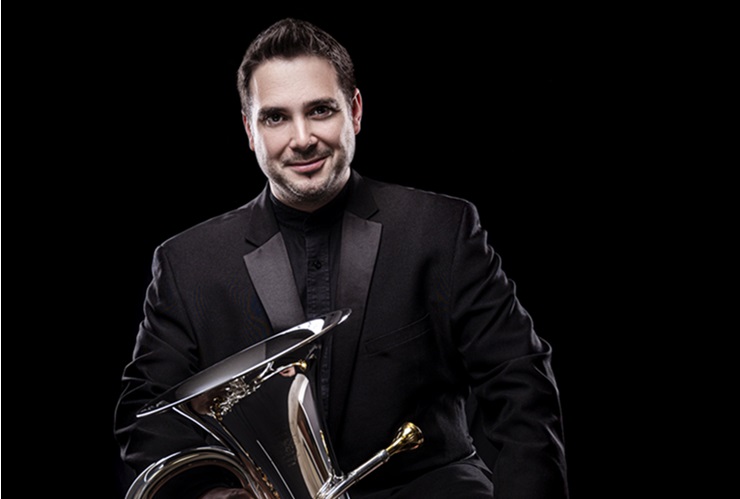
4BR manages to catch up with David Childs as he is about to put the final preparations in place ahead of the world premiere of a new Euphonium Concerto written for him by the renowned Scottish composer Sir James MacMillan.
He has just returned to Wales from the USA where he now works, for a performance that holds special significance - and which has been almost 25 years in the making.
After dropping his children off at school he is hanging up his car keys before going straight into rehearsal mode on a work that already created a great deal of critical interest.
Welsh world premiere and broadcast
“There is plenty to work on”, he says on ‘Where the Lugar meets the Glaisnock’ which he will perform with the National Orchestra of Wales at Hoddinott Hall in Cardiff under the baton of the composer on Thursday 1st May (7.30pm) and reprised 24 hours later at Swansea’s Brangwyn Hall (Friday May 2nd – 7.30pm).
In addition, Radio 3 will broadcast the premiere live on Thursday evening as part of its ‘Radio 3 in Concert’ series: https://www.bbc.co.uk/programmes/m002b6b4
‘Where the Lugar meets the Glaisnock’ which he will perform with the National Orchestra of Wales at Hoddinott Hall in Cardiff under the baton of the composer on Thursday 1st May
The double Welsh premiere is to be quickly followed by the duo reuniting in Estonia with the Tallina Kammerorkester on 10th May, followed by David travelling to Thailand for a performance with the Thailand Philharmonic Orchestra (30th May). The USA premiere will be given with the Dallas Symphony Orchestra early next year.
Grandfather
James MacMillan (below) recently gave an interview in ‘The Times’ newspaper where he spoke about the inspiration behind the elegiac composition which is dedicated to his euphonium playing grandfather.
And as he also explained in the foreword to the work, the title refers to the Ayrshire town of Cumnock where he grew up and where the River Lugar and Glaisnock meet.
“This is a concertante piece for solo euphonium and strings and is an affectionate musical memory of my early years there.
“This is a concertante piece for solo euphonium and strings and is an affectionate musical memory of my early years there.
It’s dedicated to the memory of my grandfather George Loy, a coal miner in the town and an amateur euphonium player who played in colliery bands in the area in the first half of the twentieth century. The piece is also dedicated to David Childs who commissioned the music.”
Through composed
Written in one through-composed movement lasting about 20 minutes, it begins with a slow, expressive, solitary lead from the euphonium before being joined by solo string players. The music then ebbs and flows much like the rivers themselves; the mood becoming more animated before going through the first of many metric modulations which throw the music forward into a faster tempo.
Written in one through-composed movement lasting about 20 minutes, it begins with a slow, expressive, solitary lead from the euphonium before being joined by solo string players.
The flow then increases in energy before a series of loud, violent chords brings it back to the opening slow tempo, with a rich sonorous melodic song-like quality evoking the folk song and plainchant which have figured so much in MacMillan’s music over the years.
Contrasts
Contrasting modulations push the music forward once more, before a chorale of what he calls “ecstatic strings” accompany the soloist with soft, ponderous chords which rise from the lowest to the highest orchestral sounds.
The work ends in joy and serenity: “The opening melody returns for a final time,” the composer writes, “…before the music culminates in an unexpected coda - joyous, motoric and repetitive on the strings with frantic, virtuosic bursts of energy on the euphonium. The final moments are serene.”
Big influence
In ‘The Times’ interview MacMillan said that his grandfather was “a big influence on me” - the man who ‘thrust’ a cornet into his hands. He revealed that as a miner whose work underground in the harsh environment of the pit face was grim, he “sought out beauty wherever he could… and he sought it out in music which he adored”.
He revealed that as a miner whose work underground in the harsh environment of the pit face was grim, he “sought out beauty wherever he could… and he sought it out in music which he adored”.
The work certainly pays homage to that, and, despite the harsh social deprivations that now afflicts the Cumnock area, it also highlights his own commitment to seeking out beauty in music through what he refers to as its sense of “spiritual regeneration” through his own annual Music Festival based in the town.
“I didn’t set out to consciously to evoke my childhood with this piece,” he admits. “But I think there may be subliminal messages at work.”
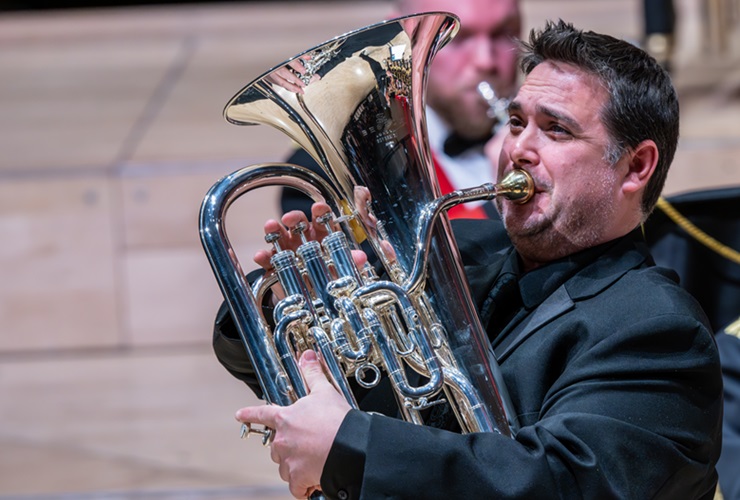
Image: John Stirzaker
Quarter of a century
For David Childs, it is a culmination of almost a quarter of a century of waiting, during which time he has given world premieres of around 15 other concertos. Through his musical advocacy the euphonium (in his hands at least) is now rightly regarded as a concerto instrument befitting the orchestral stage – and this concerto arguably its ultimate affirmation.
For David Childs, it is a culmination of almost a quarter of a century of waiting, during which time he has given world premieres of around 15 other concertos.
“I got hooked on his music when I was taking part in the BBC Young Musician of the Year competition,” he explained.
“I heard the percussion concerto ‘Veni Veni Emmanuel’ and made such an impression on me. I asked him if he would consider writing a work for me, and he wrote me a lovely letter which said that one day he hoped he would be able to, and he has kept in touch ever since.
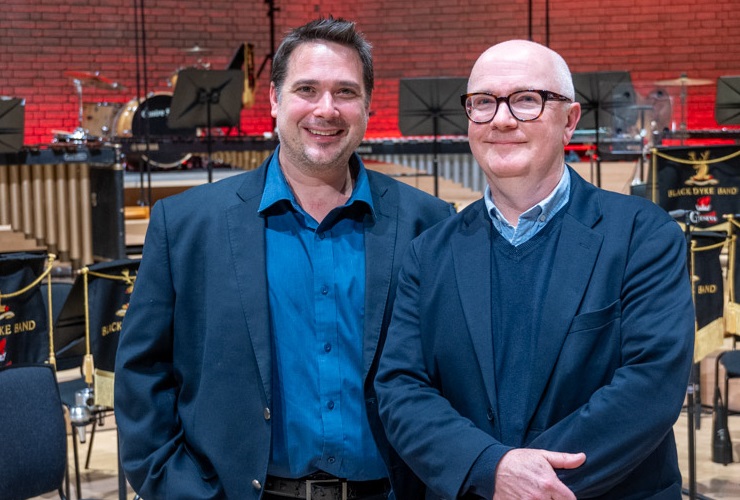
David recently gave the premiere of Peter Graham's Euphonium Concerto (Image: John Stirzaker)
Knew exactly
Things finally came together about two and half years ago and with the generous help and assistance of the Euphonium Foundation UK and BBC Radio 3 this co-commission was started.
David revealed that the composer knew exactly what he wanted to write, and the result is a composition of deep personal meaning and elegiac beauty. It will also be a work that not only adds to the concerto repertoire but will he hopes, be performed regularly around the world.
It will also be a work that not only adds to the concerto repertoire but will he hopes, be performed regularly around the world.
“When I received the work, the music spoke for itself. Nothing has been changed. I visited James at his home in Scotland to discuss and get a feel for the music with him at the piano, but it was complete. The writing is sublime and his understanding of the euphonium as a lyrical voice is quite incredible.
It has been an honour and privilege to work on it with him, and I’m delighted that after the initial performances it will be made available to all players. It is a work that deserves to be performed across the world.”
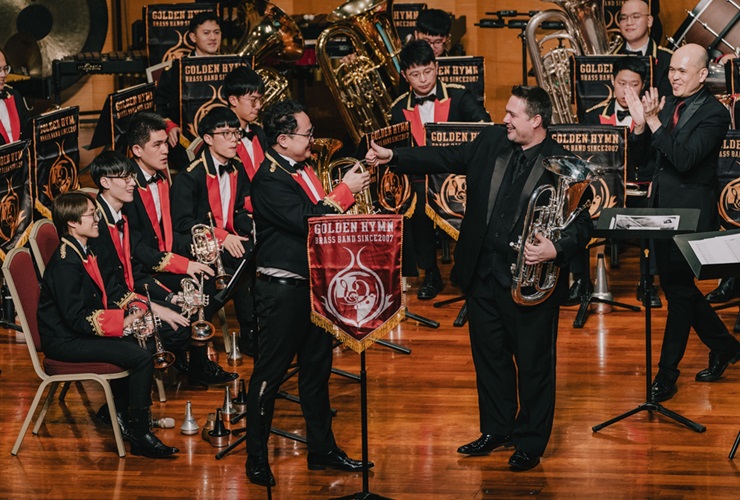
A performer with a global reach
Global reach
David is also hoping that will also see him add to its initial tally, whilst in the meantime he has also been working on his latest recital release on the Naxos lable which will be due out later this year.
“That hard work never stops,” he said before heading for some practice. “But I’m very fortunate to be able to work with musicians such as James Macmillan.
It’s going to be very special to give the world premiere of ‘Where the Lugar meets the Glaisnock’ in Cardiff with him conducting the National Orchestra of Wales.”
Iwan Fox
Expressions of Folk
National Orchestra of Wales
Conductor: James MacMillan
Hoddinott Hall, Cardiff
Thursday 1st May (7.30pm)
Tickets: https://www.bbc.co.uk/events/ex8mzc
Expressions of Folk
National Orchestra of Wales
Conductor: James MacMillan
Brangwyn Hall, Swansea
Friday 2nd May (7.30pm)
Tickets: https://www.bbc.co.uk/events/e4nqwh



